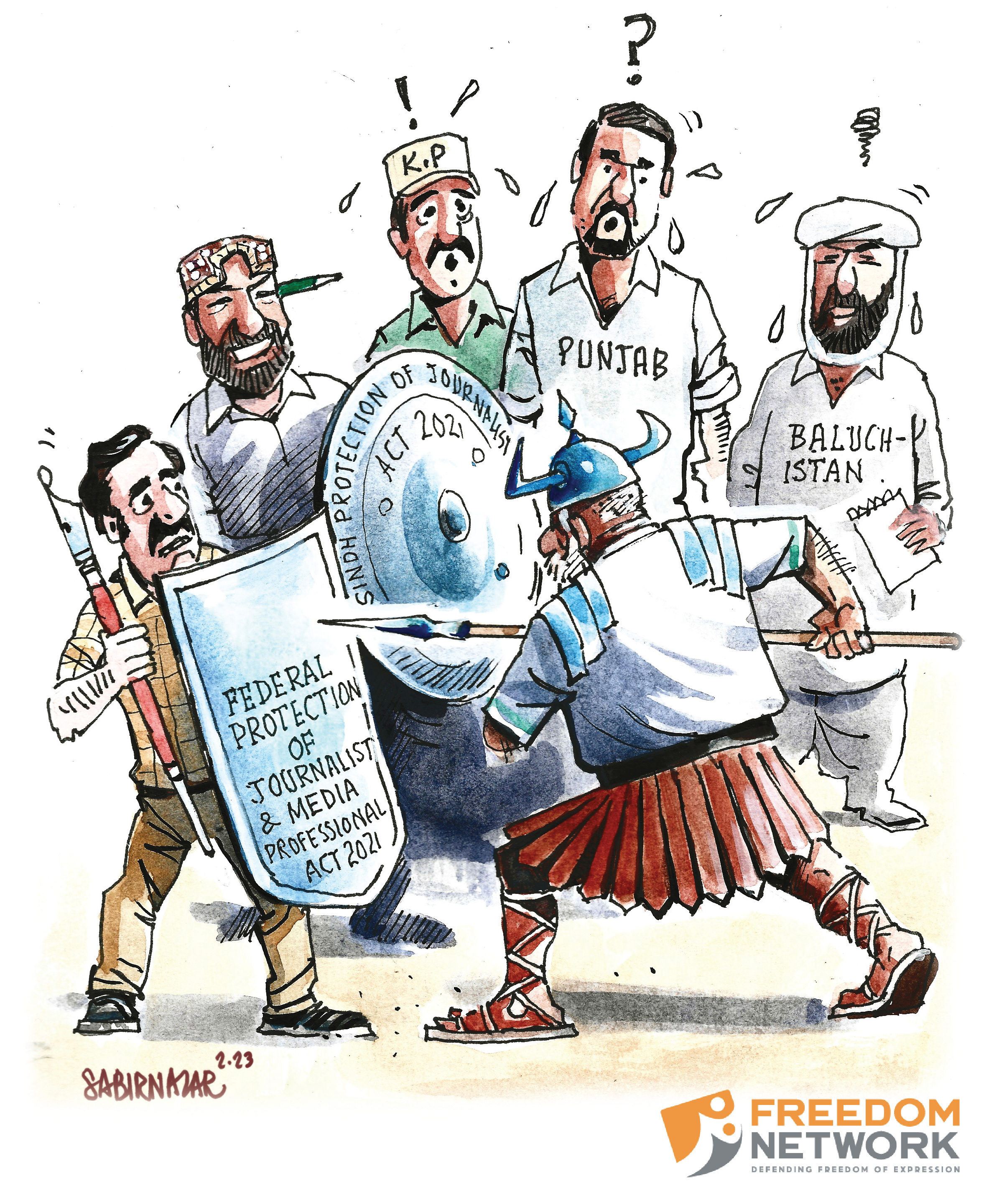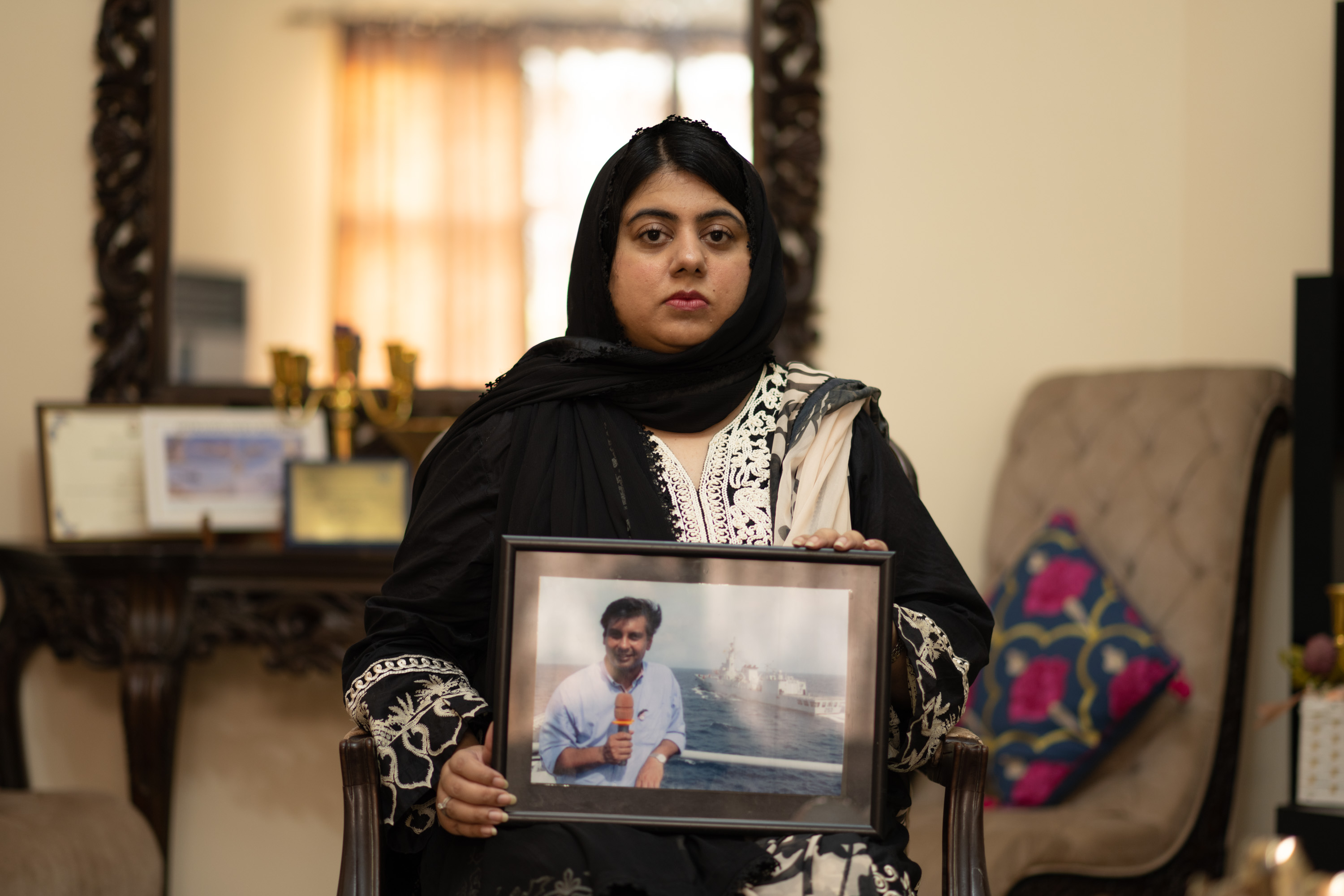Over 100 journalists and media workers, according to Pakistan Federal Union of Journalists, have been killed in Pakistan in the new millennium at an average of one a month after 2007. Over 2,000 have been kidnapped, tortured, injured, arrested, detained and or intimidated in the same period. No other country has a worse record for this period. While the conflict conditions in which they work are well documented, little is known about the lives of Pakistani journalists, their everyday pressures and threats, and how they cope with them. A new book by media analyst and chronicler Adnan Rehmat, “Reporting Under Threat,” brings to light for the first time the true stories of dozens of Pakistani journalists, including editors, reporters, camerapersons and photographers. Freedom Network will be serializing these breathtaking stories on this website.
The third of the testimonials is about Hamid Mir, senior journalist hosting ‘Capital Talk’ show on Geo News channel who is attacked in Karachi on April 19 while leaving airport for channel’s office. —————————————————————————————————————
Hamid Mir
Reporter, Columnist, Analyst, Anchorperson, Islamabad
“Don’t try to become a journalist. It’s a dangerous profession in Pakistan”. These were the words of my late father he told me three decades ago when I was a college student. My father was a professor of Journalism at the University of Punjab, Lahore, and also a famous columnist. One day I wrote an article about the problems of students and sent it to a major Urdu newspaper. My article was published on the editorial page. I criticized government policies in that article. My teachers at college and friends were thrilled on the publication of the article. It was a big achievement for a young student but the reaction of my father was very unusual. He gave me a small lecture very politely about the hazards of journalism in Pakistan. He himself faced multiple pressures after criticizing the policies of (late) military dictator General Ziaul Haq. He told me very clearly, “the government is not happy with me, some religious fanatics also following me day and night; they may assassinate me or poison me, it is very dangerous to write truth in Pakistan. You better play cricket and stay away from writing.”
I was disappointed but within a few months the fears of my father came true. He died one day in mysterious circumstances. Many human rights activists demanded his autopsy but government authorities buried him within a few hours of his death. Fortunately or unfortunately, I never followed the advice of my father. I joined journalism immediately after his death on the wish of my late mother. She was a brave woman. She even encouraged one of my younger brothers to become a journalist and follow the footsteps of our father. She is no more alive to see that journalism is still a very dangerous profession in Pakistan.
Three decades had been passed but situation getting worse for journalists in Pakistan. No doubt that there is lot of growth in journalism in the last one decade in the country. More and more young people are coming into this profession because they think media is independent and becoming a tool of social change in Pakistan. In fact media is paying a heavy price of its independence. Dozens of journalists had been killed since 9/11 in Pakistan. Many of them were kidnapped, tortured and killed. Sometimes we know their killers but they are more powerful than the law. I know dozens of journalists who have been forced to quit this profession or leave their home towns. I also know some journalists who refused to quit the profession and also refused to leave their home towns and as a result they were killed. Physical attacks and threats of violence represent an extreme form of unannounced censorship in Pakistan.
Since 2012 Tehreek-e-Taliban Pakistan (TTP) has issued edicts against some media organizations. They especially decorated their edict with the pictures of their two most hated journalists. One is famous columnist Hasan Nisar and other is mine. This is not the first time TTP threatened me. They sent me a detailed threatening letter in 2012 when I took a stand against them after they attacked young education campaigner Malala Yousafzai in Swat. After few days of their threat a bomb was planted under my car and TTP accepted the responsibility of planting the bomb. TTP is not the only threat for me and other independent journalists. We are more worried about the double games and threats by our security agencies. Many times security agencies kidnapped and killed our colleagues but blamed TTP. Both TTP and our security agencies are enemies of media freedom. TTP pressurize media by accusing us of being anti-Islam. Security agencies try to dictate media in the name of patriotism but when we refuse to listen they declare us “anti-state” through their proxies in media.
Take my example. I was first declared “anti-state” by the spokesperson of Pakistan Army on state controlled Pakistan Television (PTV) in 2005. My only crime was that I reached a mountain village of Neelam Valley of Kashmir where Army never supplied any relief goods after two months of earthquake. Intelligence agencies reported to military dictator Pervez Musharraf that I was maligning the Army on the behest of some enemies. Musharraf ordered the Vice Chief of the Army Staff to visit that village in a helicopter and verify the facts and ultimately I was proved right. After sometime a top aide of dictator Musharraf tried to use me against Chief Justice of Pakistan Iftikhar Chaudhry and offered me Rs150 million for one television show against the CJP. When I regretted I was threatened and subsequently banned on television in 2007 along with five other TV anchors.
After the departure of Musharraf I started highlighting the issue of missing persons in my television show but I realized that even though Musharraf was gone his policies were intact. I was contacted by ISI, the country’s powerful intelligence agency. They asked me to ignore the issue of missing persons in national interest but I tried to convince them that I was only performing my professional duty by highlighting violations of human rights guaranteed in the constitution of Pakistan. My explanation was considered as defiance and resulted in an attack on my children when they were going for their tuition in Islamabad. It was an attack below the belt which shattered my nerves.
That was not the end. ISI tried to involve me in a murder case on the basis of a concocted telephonic conversation. Many fellow colleagues started my media trial on the pressure of a Navy officer posted in the media wing of ISI but nothing was proved against me in any court of law. In December 2011, I received some threatening text messages on my mobile phone. I decided to make public all the threats. A debate was started in our parliament on threats to media. Former speaker National Assembly Dr Fehmida Mirza formed a special committee to investigate the threats to the media. Ahsan Iqbal (now a minister in the PML-N government) was made the head of that committee. I provided phone numbers to the speaker from where I received threats. After few days an ISI official visited me and apologized on the “individual act” of some officers. He said, “It was the act of some individuals but the whole institution does not think like that.” I never pressed the issue because I have no personal agenda against any institution or person. The special committee of the National Assembly on the threats to the media submitted its detailed report to the speaker on March 13, 2013, but there was no mention of any investigation about threats given to me.
Journalists in Pakistan don’t invite trouble only from TTP and security agencies. Sometimes diplomats of powerful countries also get angry with us. Former US ambassador Anne Patterson wrote a letter against me and my fellow anchor Kamran Khan to my management three years ago when I discussed alleged activities of Blackwater in Islamabad. Recently, I was informed by the management of my TV channel that the head of one anti-democracy think-tank tried to hire a person to kill me. This fanatic is very much known for his links with intelligence agencies. Sometimes he declares me “CIA agent,” sometimes “RAW agent” and sometimes “a Taliban agent.” My TV channel filed a case against that person in a court of law and provided evidence that some anti-democracy elements funded by intelligence agencies are trying to blackmail independent media in the name of Islam and patriotism. A Karachi court issued arrest warrants of the accused but he is still at large because he is very thick with powerful intelligence agencies.
Many people think that media is strong in Pakistan. They think I am influential but the fact is that I am not sleeping in the same place for about a year now. I am not living a normal family life just because I am a journalist. If I am living a miserable life in the capital of Pakistan then think about hundreds of other Pakistani journalists who are working in other conflict areas. They are more vulnerable than me. They are facing threat of impunity day and night from state and non-state actors. The government has failed to provide them any security.
What should we do? Should we quit this profession? No! We will not because our readers and viewers are our biggest strength. The people of Pakistan are the best judge. They know we are fighting for their right to know. We are their hope. Enemies of media freedom cannot silence our voice because we live in the hearts and minds of our people. One thing is clear: we, the journalists, will keep fighting. We will not surrender. It is the constitutional obligation of government to provide security to journalist community. Government is aware of the threats to us from non-state actors as well as the state actors. If anything bad happens to us the government will be responsible.
Three decades ago my father advised me to stay away from journalism. Now I am thinking to give the same advice to my son but I know he will not listen to me and the struggle will continue. The new generation of Pakistan will not accept unannounced censorship in their homeland.
———————————————————————————————————-
Note: This entry is reproduced from “Reporting Under Threat,” a book published in 2014 by media analyst Adnan Rehmat, which includes testimonies from about 60 journalists in Pakistan as a representative sample of the 18,000 journalists in the country who put their lives in danger on a daily basis to bring us news and keep us informed. The book is an attempt to inform the world about their secret, grim lives. Unwept and unsung, these are the true-life stories of our story-tellers. The book seeks to help change public perceptions about Pakistani journalists who are often blamed for the shortcomings of media houses and their policies without realizing the astonishing risks they assume and the extraordinary courage they employ to defend freedom of expression and right to information. The author can be reached at adrehmat@gmail.com
—————————————————————————————————————-
The Pressures Of Censorship And Self-Censorship
- April 19, 2014
- 3:53 pm
- No Comments
More from the News section
September 18, 2023
No Comments
July 26, 2023
No Comments
June 20, 2023
2 Comments
March 21, 2023
No Comments
August 30, 2022
No Comments

Resize text-+=

